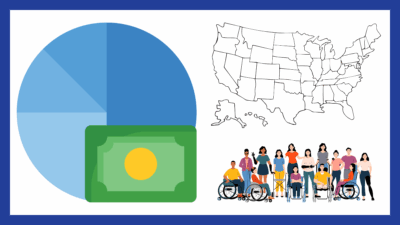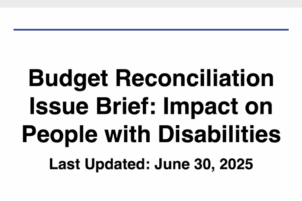 Congress is currently debating the 2025 Federal Budget Reconciliation bill, and the proposed changes could dramatically reshape how states run essential programs like Medicaid and the Supplemental Nutrition Assistance Program (SNAP). If passed, these changes could cause millions of disabled people, older adults, and low-income families to lose critical support.
Congress is currently debating the 2025 Federal Budget Reconciliation bill, and the proposed changes could dramatically reshape how states run essential programs like Medicaid and the Supplemental Nutrition Assistance Program (SNAP). If passed, these changes could cause millions of disabled people, older adults, and low-income families to lose critical support.
What’s Being Proposed?
The federal government is proposing to expand work requirements for programs like Medicaid and SNAP. While these changes are presented as standard policy measures, they may create steep barriers to access, especially for disabled individuals who encounter workforce discrimination, unpredictable health needs, or difficulties securing reasonable accommodations.
States may be required to implement stricter work requirements for Medicaid, potentially changing eligibility criteria for healthcare coverage. These adjustments could increase administrative complexity, delay access to services, and make it harder for some people with disabilities to maintain coverage. Similarly, proposed changes to SNAP would raise the age threshold for mandatory work requirements, making more older adults subject to them. States would also have less flexibility to waive these requirements based on local economic conditions, which could limit available safety nets and increase the risk of food insecurity.
The Bigger Picture: Potential Cuts to State Funding
In addition to the proposed changes, the 2025 Budget includes significant funding reductions—roughly $300 billion from SNAP and $715 billion from Medicaid over the next decade. These changes could shift more financial responsibility to states. To make up the shortfall, states may cut other critical programs like housing, education, public transportation, and workforce development.
This could mean:
- Fewer resources for accessible public transit
- Cuts to inclusive education programs
- Reduced funding for employment supports that help disabled people enter or stay in the workforce
- Shrinking access to affordable, accessible housing
Why This Matters for Disability Justice
These proposed changes could significantly affect access to essential services for people with disabilities. For example, reductions in Medicaid funding may limit access to home and community-based services that help individuals live independently. Changes to SNAP could increase food insecurity for people who rely on fixed incomes, such as those receiving Supplemental Security Income (SSI) or Social Security Disability Insurance (SSDI). Additionally, reduced state funding may impact programs such as vocational rehabilitation, paratransit services, and supported employment initiatives.
What You Can Do
To learn more and make your voice heard, visit our Action Center. There, you can find tools and information to help you contact your Senators and Members of the House of Representatives and urge them to reject the proposed cuts to Medicaid and SNAP.







